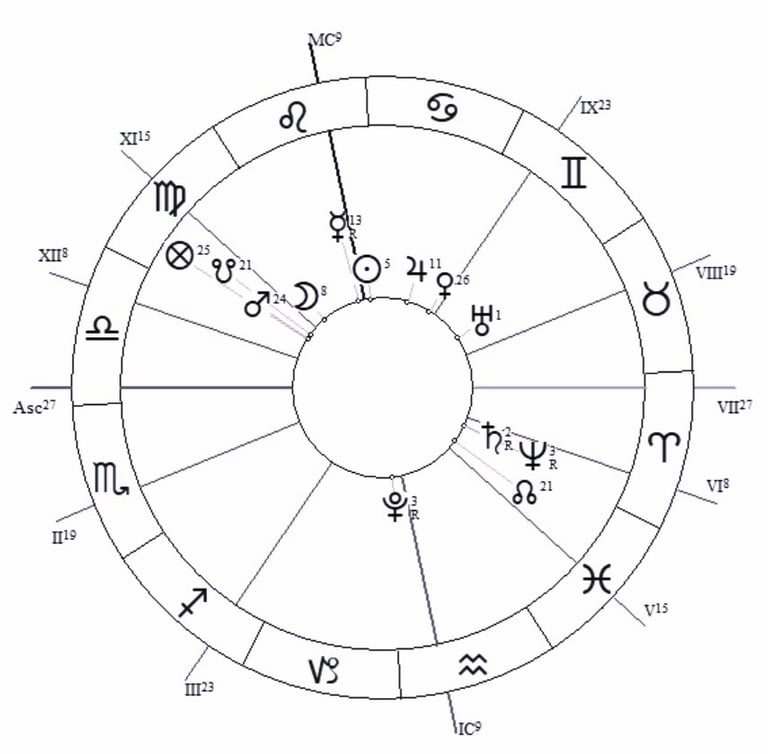THE MAD WORLD OF PREDICTIONS
Explore how common sense does not so much negate certain astrological techniques or rules as it rises above them, and at times even harmonizes with them, always preserving not only the guiding thread of judgment but also the imperative mood in its approach.


The Mad World of Predictions
Oh, this mad, mad, mad… no, not the world of Stanley Kramer. The race for treasure has not yet exhausted the material highway of life, leading to an abyss from which there is no return, but it has grown far more technological. The suitcase of money is no longer buried beneath some great “W” — unless that “W” stands for “www” — but resides in the cloud storage of scientific data, enabling the creation of new iPhones, GPTs, or Groks, which supplant genuine human connection and neural pathways in the name of servitude, under the banner of freedom and progress. A voluntary bondage to the digital realm. A coveted utopia of an era of “machine-like men, with machine minds and machine hearts,” as the Great Dictator, in the form of Charlie Chaplin, might have proclaimed. Inventions and discoveries crafted for a singular purpose — not for the good of one’s neighbor, not for the collective pursuit of universal harmony, prosperity, or peace, and above all, not for the moral progress of humanity. But for the benefit of the few, in the name of the few, who have long ceased to care about anyone else’s fate, yours or mine, as one DDTs song so poignantly laments.
The world is veritably overflowing with scientific breakthroughs, algorithms, and calculations. They have infiltrated every sphere of human existence — even those from which they ought to remain distant, like religion or philosophy. The realm of the intangible, the domain of the soul. Or astrology — the sphere of fate.
One might think that the technical side of astrology should serve merely as a tool, employed only where truly necessary. Countless programs that calculate astrological charts, transits, Arabic parts, cusps, planetary and stellar positions, and much more have undeniably lightened the load of the modern astrologer, unlike their predecessors who labored by hand. In the past, casting a chart could take a good hour, if not more, not to mention the myriad other tasks performed without any technical aids save for ephemerides. Now, it takes mere minutes. Technology has, in many ways, eased our burden. Yet, alas, it has almost entirely robbed us of what is most essential — reason and thought, without which the art of prediction is simply inconceivable. We have replaced them with algorithms of analysis and pre-formulated answers embedded in software and apps, no less than in the minds of astrologers themselves. In other words, we have traded the living soul of astrology for an artificial framework built from the bricks of ready-made recipes.
We often witness a striking, and in many ways commonplace, phenomenon among modern horary astrologers. When it comes to predictions, techniques and pre-set algorithms take precedence over common sense. This is the peculiar “technical” malaise of our astrological age, born from the absence of the primary factor in the predictive art: judgment, not merely the mathematical computation of aspects and events. Judgment requires not only logic and reasoning, but, above all, common sense — not memorized formulas or phrases. Kribble, krabble, booms or Wingardium Leviosa, may suit fairy tales, and “an aspect equals an event” may belong in textbooks. Fortunately, astrology is neither a fairy tale nor mathematics, nor an ancient tome of recipes and rules, no matter how much some of the Great and Terrible Wizards of our field might wish it so — masking the complex processes of predictive art with an illusion of simplicity and accessibility. This illusion dissolves the moment formulas fail, which happens far more often than we’d like. If it were as simple as A+B, any fool could master predictions in a month or two, and any talented IT specialist could create a program to spit out answers to all questions about the future. Thankfully, no such program exists, nor is it possible, at least not as long as the real astrology remains a living force, reminding us that precise predictions are indeed possible and still alive. Meanwhile, the variable forecasts of modern astrology are little more than illusions painted in rainbow hues, hollow within, bursting upon contact with reality and splattering false hopes like a soap bubble. For horary charts often transcend the purely technical, formal analysis so characteristic of our time, delving into the realm of common sense, rooted in context and symbolism. Such is reality, free of the rose-tinted glasses of contrived illusions or the emerald spectacles of astrology’s Wizards of Oz.
But let us remove these glasses — be they rose-tinted or emerald — and through a horary example, explore how common sense does not so much negate certain techniques or rules as it rises above them, and at times even harmonizes with them, always preserving not only the guiding thread of judgment but also the imperative mood in its approach.


Will I get the job?
At the end of July, a young woman approached us with a question about employment. She was studying at an institute and had decided to find part-time work to cover her tuition. To that end, she applied to a customer service firm that required no specialized skills or qualifications. She was to attend an interview, after which it would be decided whether she would be hired.
«Tis the time’s plague when madmen lead the blind.»
William Shakespeare, King Lear.


27.07.2025 13:47 (GMT +3). RIGA, LATVIA.
In such questions, we typically look for an aspect between the planet representing the job and the planet representing the querent, which would affirm a Yes, unless contradicted by other indicators, such as negative receptions from the job’s planet. Prohibitions, frustrations, or refranations also remain relevant, as they signify obstacles preventing the event from manifesting in the chart. Additionally, the job’s planet residing in the querent’s house is desirable, as it suggests the employer’s interest in the querent. These are the primary technical considerations outlined in astrology textbooks. But, as is often the case, life does not neatly fit within the pages of a book.
We must always thoroughly understand the question—what it truly asks. In this case, there are no hidden complexities transforming one question into another. It is crystal clear: will she get the job or not? However, this is not merely a question about a job but about an unskilled job — a role that, essentially, anyone could fill, barring rare exceptions. We won’t delve into the specifics of the job’s nature, but suffice it to say it is low-skill labor, requiring more physical endurance than specialized mental abilities or qualities.
Why does this matter? Because common sense begins to slowly turn the key to the lock behind which the answer awaits. If the job is low-skill and nearly anyone can be hired, what does this tell us first and foremost? It suggests that we need not focus on finding an event in the chart — an aspect — indicating that the querent will get the job, but rather ensure there is no clear No. That is sufficient. A clear No would be indicated not by the absence of an aspect, as we’ve already explained, but by a negative reception from the job’s planet or another indicator, such as an opposition between the querent and the job, signaling that the querent will not get it.
If this were a question about a specialized role requiring specific skills, education, or expertise, an aspect would indeed be necessary. Without it, we could not render an affirmative judgment, and the absence of an aspect would indicate the querent would not get the job. But this is a different case.
Thus, we need only examine the querent’s planet, the job’s planet, and the receptions between them, ensuring there is no stark No, such as an opposition and so on.
The querent is represented by Venus, and the job by the Sun. Neither Venus nor the Sun reveals anything about the querent or the job itself, as that is not the question at hand. If the question were whether the job is good, we would confidently say Yes, as the Sun is in its domicile — in its own sign, Leo. But that’s not the case here, as the querent already knows the job is low-skill, so the Sun’s dignity can be disregarded.
There is no aspect between Venus and the Sun, were we concerned with aspects. Venus is void of course, preparing to change sign, while the Sun forms its first aspect with Mercury, which would signifies a prohibition if aspects were our focus. But they are not. What matters in terms of aspects is the absence of an opposition between Venus and the Sun. There is none, so we can proceed, focusing on the critical element — receptions.
Oh no… Venus has only a face reception to the Sun! How dreadful. What does this tell us? Nothing. Even a complete lack of reception to the Sun can be ignored, as the question does not necessarily require confirmation through receptions or other fantastical notions, like the Part of Fortune supposedly indicating radicality. The Part of Hunger, or the Part of the Moon — also known as the Part of Fortune — and radicality? A rather original but ignorant assumption, revealing a lack of understanding of Arabic parts specifically and astrology in general.
And so, the Sun. More precisely, the Sun’s receptions. What can we say about them? The Sun has no receptions to Venus. Let us explore what this might mean, continuing our analysis in the spirit of common sense. We are seeking the absence of a negative rather than the presence of a positive. If the Sun had a negative reception to Venus, by detriment or fall, we could stop and say, “alas, no”, even with an aspect present. But no such reception exists. Of course, it would be ideal if the Sun had a positive reception to Venus, indicating some interest from the employer, but the absence of a negative reception is sufficient for our purposes.
In conclusion, we find no negative reception from the job’s planet to the querent’s planet, nor an opposition or any other indicator of a clear No. Thus, the default conclusion is that there are no obstacles preventing the querent from securing the position. She will get the job. And indeed, she did — literally the next day, right after the interview, as she informed us that same day.
As you can see, had we adhered strictly to textbook rules, ignoring the common sense of the situation and its reflection in the horary chart, we would have reached the opposite conclusion: the querent would not get the job due to the absence of an aspect. No aspect, no event. But this holds true only if we set reason aside and become textbook astrologers, operating by the algorithms of rules and techniques rather than as living, thinking souls. For it is only when we cease to be machine-like men, with machine minds and machine hearts, that astrology reveals itself in all its beauty and power, and technologies and techniques take their rightful, but not dominant, place over heart and mind. This is worth remembering always, not only to minimize errors but to fully master the predictive art known as horary astrology.
Subscribe to our blog





